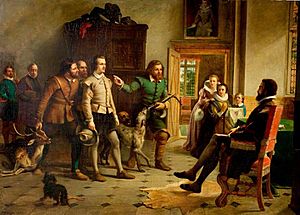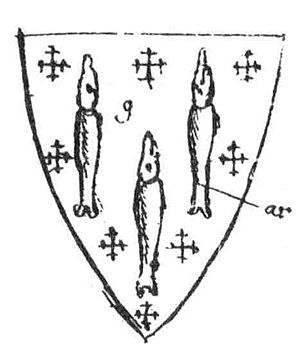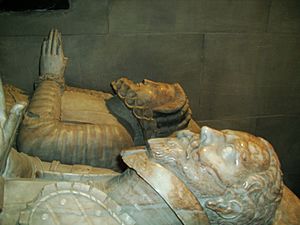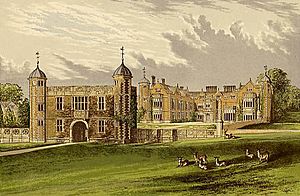Thomas Lucy facts for kids
Sir Thomas Lucy (born April 24, 1532 – died July 7, 1600) was an English politician. He served in the English Parliament in 1571 and 1585. He was also a local judge, called a magistrate, in Warwickshire. Sir Thomas Lucy is most famous for his connections to the famous writer William Shakespeare. As a strong supporter of the Protestant faith, he sometimes disagreed with Shakespeare's family, who were Catholic. There are even stories that the young Shakespeare himself had some arguments with Sir Thomas.
Contents
Early Life and Home
Thomas Lucy was the oldest son of William Lucy and Anne Fermer. His family lived at Charlecote near Stratford-on-Avon, in Warwickshire. When his father passed away, Thomas inherited several properties, including the family home, Charlecote Park. This house was rebuilt for him around 1558, using red brick.
In 1565, Queen Elizabeth's favorite, Robert Dudley, made him a knight. This meant he was given the title "Sir."
In 1571, Sir Thomas Lucy was chosen to be a Member of Parliament for Warwickshire. The Queen herself, Queen Elizabeth, even visited Charlecote Park in 1572.
A Strong Supporter of the Queen
Sir Thomas Lucy was very loyal to Queen Elizabeth and was a strong Protestant. He believed deeply in the Protestant faith. A famous writer named John Foxe, who had seen Protestants treated badly under Queen Mary, even taught in the Lucy home for a short time around 1547.
Because he was such a strong Protestant, Sir Thomas Lucy was very active in his role as a local official. He often visited Stratford-upon-Avon as a justice of the peace. This meant he helped keep law and order. He was very strict when it came to people who were Catholic, especially after some Catholic missionaries, like Edmund Campion, came to the area.
In 1584, there was a disagreement between one of Lucy's servants and Hamnet Sadler, a friend of Shakespeare. Sir Thomas Lucy helped settle this problem. He was re-elected as a Member of Parliament for Warwickshire in 1585. In 1586, he became the high sheriff of the county, which was an important local position.
Sir Thomas Lucy and Shakespeare

There are many old stories about the young William Shakespeare and Sir Thomas Lucy. One tradition says that Shakespeare wrote a funny, mocking poem about Sir Thomas Lucy in the mid-1580s. This poem might have led to Sir Thomas trying to punish Shakespeare, or it might have made Shakespeare decide to leave the area for a while. Some versions of this story include local songs that made fun of Lucy's name or even suggested his wife was unfaithful. However, there is no proof that Shakespeare wrote these songs.
The Poaching Story
Another popular story, first written down in the late 1600s, says that young Shakespeare was involved in poaching (illegally hunting animals) on Sir Thomas Lucy's land. Sir Thomas was known for trying to protect the animals on his estate. He even tried to pass a law in Parliament about it in 1585.
One writer, Richard Davies, wrote that Shakespeare "was much given to all unluckiness in stealing venison and rabbits, particularly from Sir –– Lucy who oft had him whipped and sometimes imprisoned and at last mad[e] him fly his native country to his great advancement."
Shakespeare's first biographer, Nicholas Rowe, also told this story. He connected it to the mocking poem:
For this he was prosecuted by that Gentleman, as he thought, somewhat too severely; and in order to revenge that ill Usage, he made a Ballad upon him. And tho' this, probably the first Essay of his Poetry, be lost, yet it is said to have been so very bitter, that it redoubled the Prosecution against him to that degree, that he was oblig'd to leave his Business and Family in Warwickshire, for some time, and shelter himself in London.
There are no official court records that prove or disprove either the poaching incident or the poem incident. The poaching story became very popular in the Victorian period and appeared in many drawings and paintings.
Some people have questioned the poaching story. They point out that there might not have been any deer kept at Charlecote until after Shakespeare died. However, Sir Thomas Lucy did have a "free warren," which meant he had rights to hunt rabbits, hares, pheasants, and other birds, and possibly even small deer.
Justice Shallow in Shakespeare's Plays

Some people believe that Shakespeare made fun of Sir Thomas Lucy in his plays by creating the character of Justice Shallow. This character appears in Henry IV, Part 2 and The Merry Wives of Windsor.
In The Merry Wives of Windsor, Justice Shallow and his relative, Slender, talk about the "luces" (which are fish called pike) on their family's symbol. This conversation accidentally turns into a joke about "louses" (lice), which sounds similar to "luces." Sir Thomas Lucy's family symbol actually had "luces" on it. This idea that Justice Shallow was a satire of Lucy goes back to the late 1600s.
However, some experts, like Samuel Schoenbaum, think it's unlikely that Shakespeare would directly make fun of Sir Thomas Lucy. They argue that Lucy was an important person who had served the country well, and Shakespeare wouldn't want to offend his powerful friends. Also, Sir Thomas Lucy was not physically or personally like the character of Justice Shallow described in Henry IV, Part 2.
Family Life
Sir Thomas Lucy married Joyce Acton. Their daughter, Anne, married Sir Edward Aston. Anne was the mother of a diplomat named Walter Aston. Sir Thomas Lucy's son, also named Thomas, married twice and had many children.
In 1600, there was a big local scandal involving one of Lucy's granddaughters. She ran away with one of the family's servants. Sir Thomas Lucy died during this difficult time. His son inherited the family estate. His grandson, also named Thomas, also became a Member of Parliament for Warwickshire.
See also
In Spanish: Thomas Lucy para niños
 | William L. Dawson |
 | W. E. B. Du Bois |
 | Harry Belafonte |



